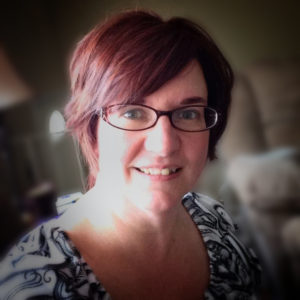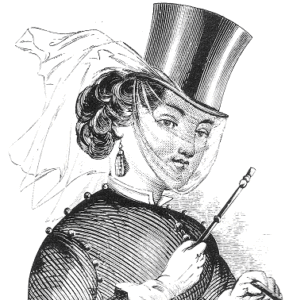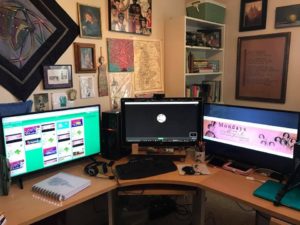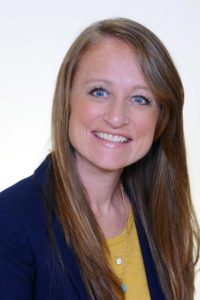Today’s entry in my How They Do It series is an interview with Amy Johnson Crow, professional genealogist and blogger at AmyJohnsonCrow.com. I really enjoy Amy’s blog, where she offers really great and practical advice, and I was privileged to do a video interview with her for her blog when we were both at RootsTech earlier this year. I hope you enjoy reading this interview as much as I did. I wholeheartedly agree with her assertion that Simple is good!
 How They Do It: Amy Johnson Crow
How They Do It: Amy Johnson Crow
How long have you been doing genealogy?
I’ve been interested ever since I was little. My grandma was the unofficial family historian in the family and she told me a lot of stories. I did my first “real” research in 1990 and became certified in 1995.
What’s your favorite part of doing genealogy?
The hunt. I love taking a research problem, figuring out how to approach it, finding resources, and putting it all together.
Do you consider your genealogy research well organized?
Fairly. I try to always go into it with some sort of objective. “Who are Matilda’s parents?” “Where was John in 1850?” “Why is there a gap in the ages of these children?” It helps me not go down the research rabbit hole as often (but it still happens!)
What type of software do you use for organizing your genealogy research?
I’m kind of between genealogy software programs right now. For organizing my research and my notes, I use Excel for timelines (I would be lost without timelines) and Word for my notes.
Do you keep a research log? If so, what format?
My notes are all in Word. I don’t keep a separate log, but I integrate it into my notes. I’ll add the title, etc. of whatever I’m looking at, why I’m looking at it, and what I found (and what I didn’t find).
Do you have a tree on Ancestry? If so, is it public or private? Why?
I have several trees on Ancestry. One is public, the rest are private. The public tree is for cousin bait and DNA. The private trees are for my “works in progress” and trees where I’m helping someone.
What’s your biggest challenge when it comes to organizing your genealogy?
Digital files, especially photos. I’ve been known to take dozens or even hundreds of photos when I’m researching or at a cemetery. I organize them by general category, but it’s the specific tagging that trips me up. There are times when I *know* I have a photo of a particular type of tombstone, but I can’t find it.
What’s your biggest piece of advice to beginning genealogists in terms of keeping track of their research?
Get in the habit of copying or scanning the title page of whatever book you’re using. Also note when you *don’t* find something.
What do you think is the most important thing for people to do to stay organized when it comes to family history research?
Find a method that works for them. Some people have to organize by family, while others go by location or record type. (I’m more of a location-based organizer myself, but I know that doesn’t work for everyone.)
If you were starting out new as a genealogist what would you do differently?
I would have started out with better citations. Back when I first started, my genealogy software allowed all of 8 characters to record a source. So many of my earliest citations were “stone” or some code that I later had no idea what it meant. It wasn’t a whole lot of fun trying to figure out where some of those facts came from!
Do you keep paper or electronic files (or both)?
Both. As techie as I am, I still love some paper.
Are you folder or binder person for your paper files?
Folders. I find them more flexible for how I organize.
Do you use Evernote, One Note or any other electronic organizing system for your genealogy? If so, how do you use it?
I’ve dabbled in Evernote, but I don’t use it regularly.
Do you have a dedicated space in your home for doing genealogy research? What’s it like?
I have my own home office. (I joke that the best piece of office equipment that I have is my door!) I’m actually scaling it back and getting rid of an entire bookcase of books (donating them to a couple of different libraries.) I love books — I am a librarian, after all — but I find that having a workspace that’s more “minimal” helps with my work.
Do you have anything to add?
There’s a lot to be said for organizing how it makes sense and is comfortable for you. However, I would encourage people not to make their systems too complicated. If another researcher or a family member ever has to go through your papers later and it isn’t clear how things are organized, that’s when research ends up getting tossed. Simple is good.
Amen, sister! A great example both of a simple organizing strategy and the kind of practical advice that Amy shares on her blog is one of her favorite posts (and mine), The Easy, Low-Tech Way to Label Scanned Photos. Organizing systems don’t have to be complicated–in fact we think it’s better if they aren’t!


 Do you have a dedicated space in your home for doing genealogy research? What’s it like?
Do you have a dedicated space in your home for doing genealogy research? What’s it like? How They Do It: Diahan Southard
How They Do It: Diahan Southard